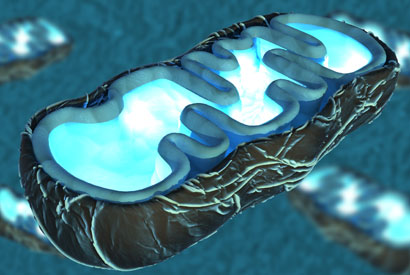
Illustration of a mitochondrion, a cell’s energy station. Within mitochondria are a multitude of proteins, which must be folded properly to function. UC Berkeley research has linked stress from mitochondrial misfolded proteins to blood stem cell aging, and they found a way to help the cells cope with the damage.
UC Berkeley scientists have identified a new molecular pathway critical to aging, and confirmed that the process can be manipulated to help make old blood like new again.
The researchers found that blood stem cells’ ability to repair damage caused by inappropriate protein folding in the mitochondria, a cell’s energy station, is critical to their survival and regenerative capacity.
The discovery, published in the March 20 issue of the journal Science, has implications for research on reversing the signs of aging, a process thought to be caused by increased cellular stress and damage.
“Ultimately, a cell dies when it can’t deal well with stress,” said study senior author Danica Chen, an assistant professor in the Department of Nutritional Sciences and Toxicology. “We found that by slowing down the activity of mitochondria in the blood stem cells of mice, we were able to enhance their capacity to handle stress and rejuvenate old blood. This confirms the significance of this pathway in the aging process.”
